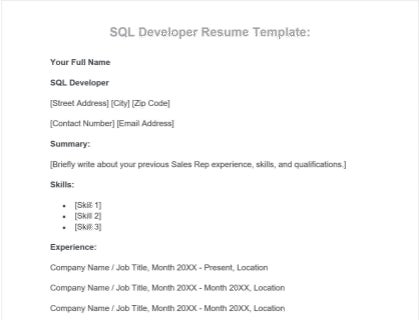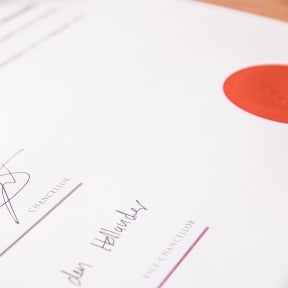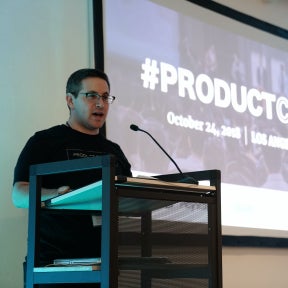
SQL Developer Free Template Download:
Download this SQL developer resume template in Microsoft Word format and start using it straight away.
Download NowSQL Developer Resume Example:
Your Name
SQL Developer
[Link to website / online portfolio / LinkedIn profile]
[Street address]
[City]
[Zip code]
[Contact number]
[Email address]
Summary:
[Briefly talk about your background, skills, and qualifications.]
Key Skills:
- [Skill 1]
- [Skill 2]
Experience:
Company Name / Job Title
Month 20XX - Present, Location
Company Name / Job Title
Month 20XX - Month 20XX, Location
Company Name / Job Title
Month 20XX - Month 20XX, Location
Education:
School Name / Degree
Month 20XX - Month 20XX, Location
School Name / Degree
Month 20XX - Month 20XX, Location
Certifications:
- [Certificate 1]
- [Certificate 2]
Notable Achievements:
- [Achievement 1]
- [Achievement 2]
Awards:
- [Award of excellence 1]
- [Job promotion 1]
How to Write a SQL Developer Resume:

A complete guide to writing an SQL developer resume with a free template.
Start with a summary.
Make your summary stand out.

Your summary should create a lasting impression, intriguing employers enough to continue reading your resume. Start by showcasing your most desirable qualities including your skills, years of experience, and top achievements.
Keep your summary short and to the point.

Try to keep your summary under four sentences and only include the most important information. Add a sentence about how your specific skill set and experience will benefit the employer's organization.
Showcase your key skills.
Start with your most important skills.

Mention your core SQL developer skills first, such as database development and optimizing optimized SQL queries for integration. Be sure to mention all relevant skills that could set you apart from other candidates.
Match your skill set with the job posting.

List all relevant skills and competencies you have acquired over time. You'll want to directly match your skills with the job requirements and do not list skills that will not be needed for the position.
Be honest.

When listing your skills, remain truthful about your level of expertise as the recruitment process may require practical assessments.
Outline your work experience.
Present your experience in reverse chronological order.

The work experience section is an imperative part of your resume as employers will want to read about the SQL projects and tasks you've completed in previous roles. You'll want to start this section with your most recent position.
Add the places you have worked.

Pay special attention to the responsibilities you were assigned in previous roles. This will help employers envision you in the position and determine the type of tasks you're knowledgeable in.
Add your education information.
List your qualifications.

In reverse chronological order, add your qualifications. Each qualification entry should mention an institution name, the dates of attendance, and a location.
Indicate qualifications in progress.

If you're studying towards a qualification, mention it at the start of this section. Omit the initial date and instead include the words "In Progress."
Include your certifications.
List any relevant certificates.

Although your portfolio of projects already says a lot about you and your abilities, to help improve your chances of an interview, consider adding relevant certifications, even if not required.
Start with your most relevant certificate.

If you obtained more than one certificate, consider which one employers would be most interested in and mention it first.
Common certificates related to SQL developers include:
- Microsoft SQL certification.
- MCSA.
- Oracle MySQL.
Add certification details.

Be sure to include the institution and the date you obtained your certification. Certificates awarded by accredited institutions indicate to employers that you have formal training and that you're passionate about your job.
Highlight your achievements.
Add career highlights.

Your career milestones are a great addition to your resume because they act as solid references, proving to employers that you're more than capable of exceeding their expectations.
You'll immediately want to capture an employer's attention, so start this section with your most notable SQL projects.
Outline major completed projects.

You'll want to provide sufficient details, for example, SQL projects you are particularly proud of. Be sure to include metrics to emphasize the impact your achievements had on the business. The more specific, the better.
List your awards and job promotions.
Add key career moments at the end of your resume.

These typically include professional achievements such as awards or job promotions that may be of particular interest to employers.
Provide the details of your professional achievements.

Use bullet points to briefly describe each accomplishment and list them in reverse chronological order. Remember that each entry should also identify the institution/employer. Don't forget to provide a date.


